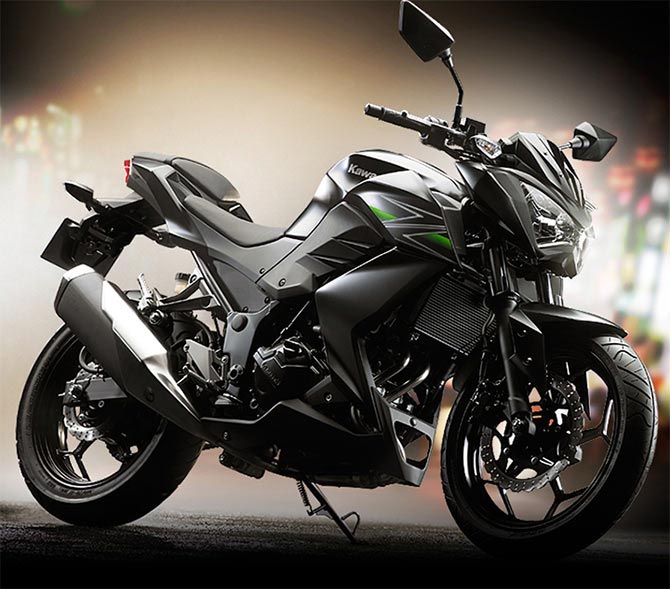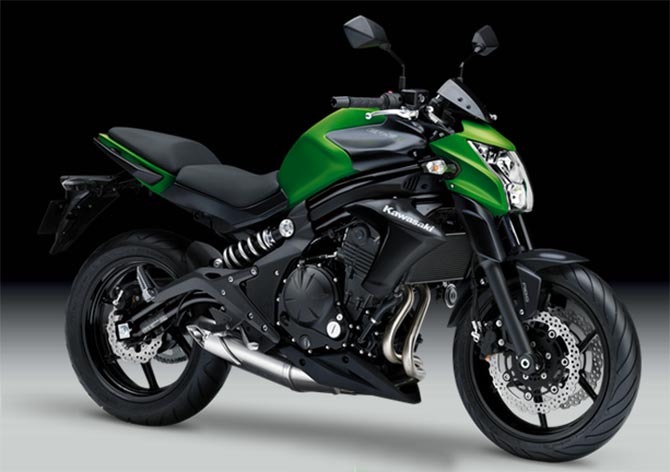Kawasaki launched two new jewels, one of which is its most affordable machine and the other is a middle weight performance bike, in India recently. Christened Kawasaki Z250 and ER-6n, the bikes are priced smartly at Rs 2.99 lakh and Rs 4.78 lakh respectively (ex-showroom, Delhi).
The motorcycles are coming to India via CKD route and will be available at pro-biking dealerships.
Design

Kawasaki has kept the aesthetics of these bikes aggressive with eye-pleasing naked looks inspired by legendary Ninja and Z series. Both the machines have heavy-front and sharp rear and carry a potential mill in the belly.
Superior suspension systems are equipped to the Kawasaki ER-6n and Z250 that are equipped for mass centralisation. While Z250 flaunts its beautiful crafting, the formidable engine of ER-6n is something irresistible.
Inspiration
The idea of these motorcycles has been extracted from its predecessors, which are already celebrating their success in the Indian market. Ninja 650, which is one of the finest racing modules in its segment, is the one that reduced its baggage to become ER-6n.
On the other hand, Z250 is another version of Ninja 300 with minimal body parts, wherein its headlight and engine shrouds are inspired from Z800. Placing the true essence of Kawasaki motorcycles, they appear highly competitive and worthy.
Engine
Kawasaki ER-6n comes coupled with a liquid-cooled, 4-stroke, DOHC, 8-valve, parallel-twin engine that displaces 649cc. The engine is configured to churn out the maximum power of 71bhp at 8,500rpm with a maximum torque value of 64Nm at 7,000rpm.
Mated to a 6-speed transmission, it gives a feeling of a pocket-rocket with a subtle twist of wrist. Fuel injection system with 17 litre of fuel tank capacity assist the rider on a long journey.
On the other hand, Kawasaki Z250 brings to life the heart of 2013 Ninja 250R, which is 249cc, liquid-cooled, DOHC, 8-valve, parallel-twin engine with fuel injection.
The mill is mated to a 6-speed transmission and generates a supreme power of 31.5bhp at 11,000rpm and a peak torque of 21Nm at 10,000rpm.
Powerful enough to take down its opponent, its fuel consumption is expected to be commendable with 17 litre fuel tank storage.
Suspensions

Kawasaki has constructed the ER-6n on a tubular diamond, high-tensile steel frame while Z250 is built upon semi-double cradle and the same strength of high-tensile steel frame. Both the machines have superior riding quality with Telescopic front forks.
The rear suspensions differ, wherein offset laydown single-shock with 7-way adjustable pre-load is equipped to ER-6n and bottom-link uni-trak with 5-way adjustable preload comes with Z250.
These suspensions work efficiently increasing the stability and giving more confidence to the rider while cornering.
Tyres and braking
Kawasaki has used wider tyres for more grip, ER-6n and Z250, being power packed machines require a fat tyre that may help the rider to experience best performance from it. ER-6n comes fitted with 120/70ZR17M/C (58W) tyre at the front and 160/60ZR17M/C (69W) tyre at the rear.
With black alloy wheels, the tyres are further equipped with dual 300mm petal semi-floating discs with dual piston caliper at the front and 220mm petal disc brake with single piston at the rear.
New compact ABS is kept as an option for prospective buyers who can add to the efficiency of the braking system.
Kawasaki Z250, on the other hand, comes coupled with 110/70-17 inch front tyre and 140/70-17 inch rear tyre. It sports Black Mag alloys with 290mm hydraulic disc with two-piston calipers at the front tyre and 220mm disc with two-piston calipers at the rear tyre.
Lacking the advantages of an ABS, the bike still manages to offer a fine braking response.
Dual Throttle Valves
Kawasaki has used its Dual Throttle Valves technology in both the machines making them smoother and swifter at all rev levels. Control of air intake gets better with this technology and leads to high performance by increasing mileage and power.
The company designed this technology to meet the rider's intention, while at the same time offering them the natural-feeling.
Instrumentation
Kawasaki ER-6n and Z250, both features an easy-to-read analog plus digital instrument cluster. Designed with the same pattern, large analog dial with small LCD screen, both the clusters complement the aggressiveness of the motorcycles. The instrument panel of Kawasaki Z250 is stylish as well as colorful. It displays all the required information with its analog tachometer and digital speedometer, dual trip meter, fuel level and clock. Mounted at the handlebar, it is highly visible and easily readable to the rider.
ER-6n's instrumentation displays an analog tachometer and digital fuel gauge, speedometer, clock, odometer, dual trip meter, remaining range and average/instant fuel consumption. Economical Riding Indicator has been added to the panel that not only indicates the rider about the economy but also helps him to bring down the fuel consumption.












 © 2025
© 2025